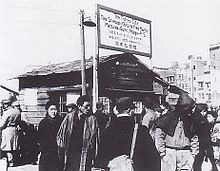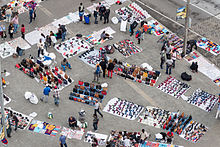
Back Sluikhandel Afrikaans سوق سوداء Arabic السوق السودا ARZ Qara bazar Azerbaijani Чорны рынак BE-X-OLD Черен пазар Bulgarian কালোবাজার Bengali/Bangla Mercat negre Catalan Černý trh Czech Schwarzmarkt German
| Grey market |
|---|
| Part of a series on |
| Economic systems |
|---|
|
Major types
|


A black market, underground economy, shadow market or shadow economy is a clandestine market or series of transactions that has some aspect of illegality or is not compliant with an institutional set of rules. If the rule defines the set of goods and services whose production and distribution is prohibited or restricted by law, non-compliance with the rule constitutes a black-market trade since the transaction itself is illegal. Such transactions include the illegal drug trade,[clarification needed] prostitution (where prohibited), illegal currency transactions, and human trafficking.[1][2][3]
Participants try to hide their illegal behavior from the government or regulatory authority.[4] Cash is the preferred medium of exchange in illegal transactions, since cash transactions are less easily traced.[5] Common motives for operating in black markets are to trade contraband, avoid taxes and regulations, or evade price controls or rationing. Typically, the totality of such activity is referred to with the definite article, e.g., "the black market in bush meat".
The black market is distinct from the grey market, in which commodities are distributed through channels that, while legal, are unofficial, unauthorized, or unintended by the original manufacturer, and the white market, in which trade is legal and official.
Black money is the proceeds of an illegal transaction, on which income and other taxes have not been paid. Black money is often associated with money laundering, a process used to conceal the illegitimate source of the money. Because of the clandestine nature of the black economy, it is not possible to determine its size and scope.[6]
- ^ Horning, A.; Thomas, C.; Marcus, A.; Sriken, J. (2019). "Risky business: Harlem pimps' work decisions and economic returns". Deviant Behavior. 41 (2): 160–185. doi:10.1080/01639625.2018.1556863.
- ^ "Internal Revenue Service Summary of Estimation Methods" (PDF). irs.gov. Internal Revenue Service.
- ^ Feige, Edgar L. (1989). The Underground Economies: Tax Evasion and Information Distortion. Cambridge University Press.
- ^ Feige, Edgar L. (2009). "Defining And Estimating Underground And Informal Economies: The New Institutional Economics Approach". World Development. Elsevier. 18 (7): 989–1002. doi:10.1016/0305-750x(90)90081-8. S2CID 7899012.
- ^ Feige, Edgar L. (2012). "New Estimates of U.S. Currency Abroad, the Domestic Money Supply and the Unreported Economy" (PDF). Crime, Law and Social Change. 57 (3). pp. 239-263: 239–263. doi:10.1007/s10611-011-9348-8. S2CID 153877115.
- ^ "Black Money in India". LawJi. Archived from the original on September 18, 2018. Retrieved September 19, 2018.